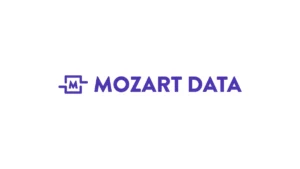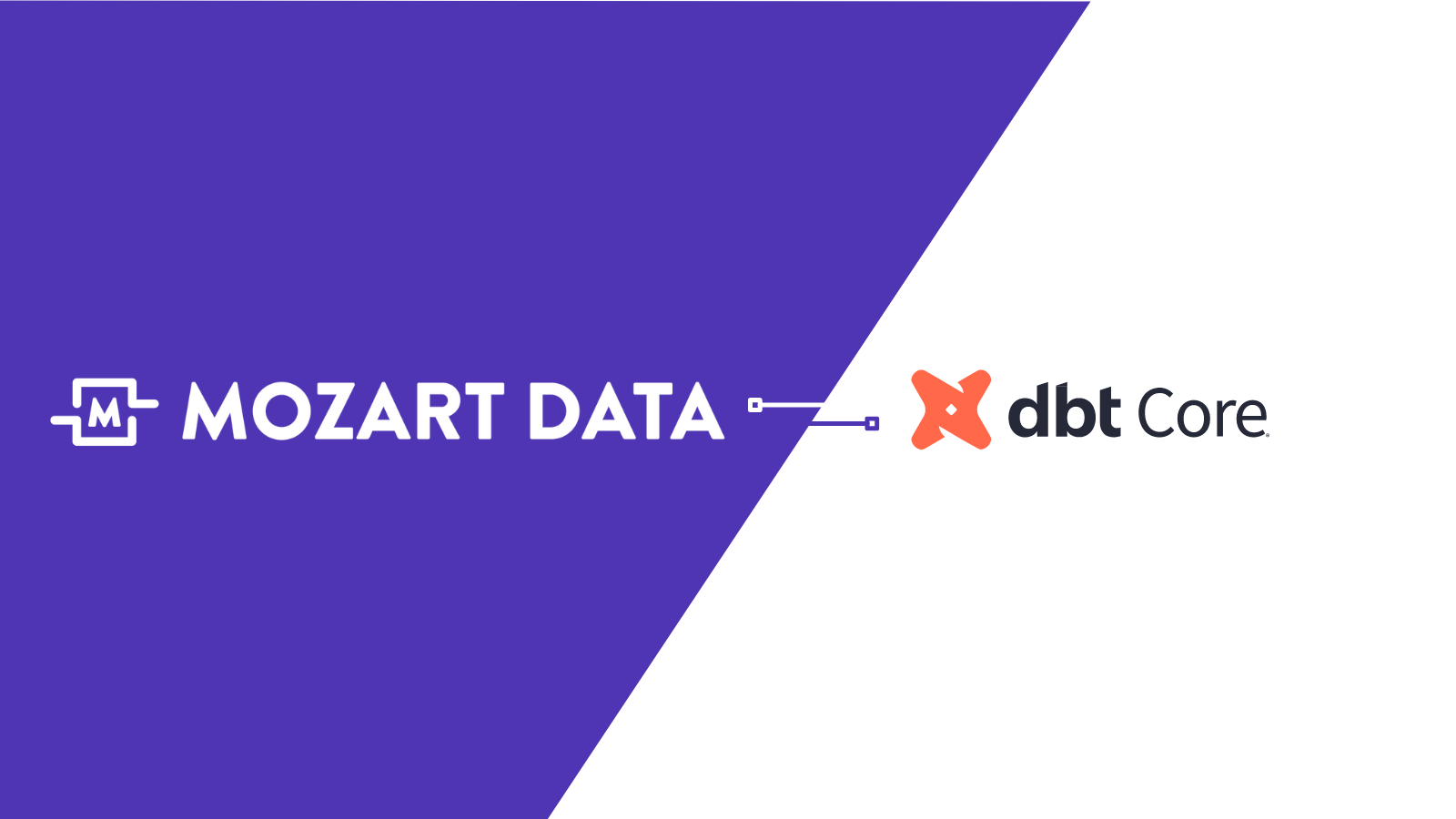
Last month, we integrated dbt Core (“dbt”) into Mozart as another transformation layer in addition to our existing SQL-based transformation layer. We’re excited about this integration, as dbt is a great tool that allows data teams to collaboratively build, test, and deploy data models in data warehouses. In this blog post, we will share the key benefits of using Mozart Data and dbt Core, and why we integrated dbt into Mozart Data.
First, what is dbt?
dbt (data build tool) Core is a popular open-source product developed by dbt Labs for data transformation. The product has gained popularity among data teams in the last few years and has enabled teams to adopt more rigorous software engineering practices in deploying data products.
So, why did Mozart integrate with dbt Core?
1. Software engineering principles in data
Data plays a crucial role in making important business decisions, which is why Mozart believes that data products should undergo the rigorous, thorough process applied in software product development.
With the integration of dbt Core, Mozart users can better apply software engineering principles like testing, code reviews, and version control to the data transformation and orchestration process. This ensures that data is reliable, accurate, and consistent before creating data models, leading to increased confidence in the business decision-making process.
Now, data/analytics engineers and analysts can write modular, reusable code, conduct automated tests to identify any issues or anomalies and collaborate with their operations teams or other stakeholders who work in data through code reviews.
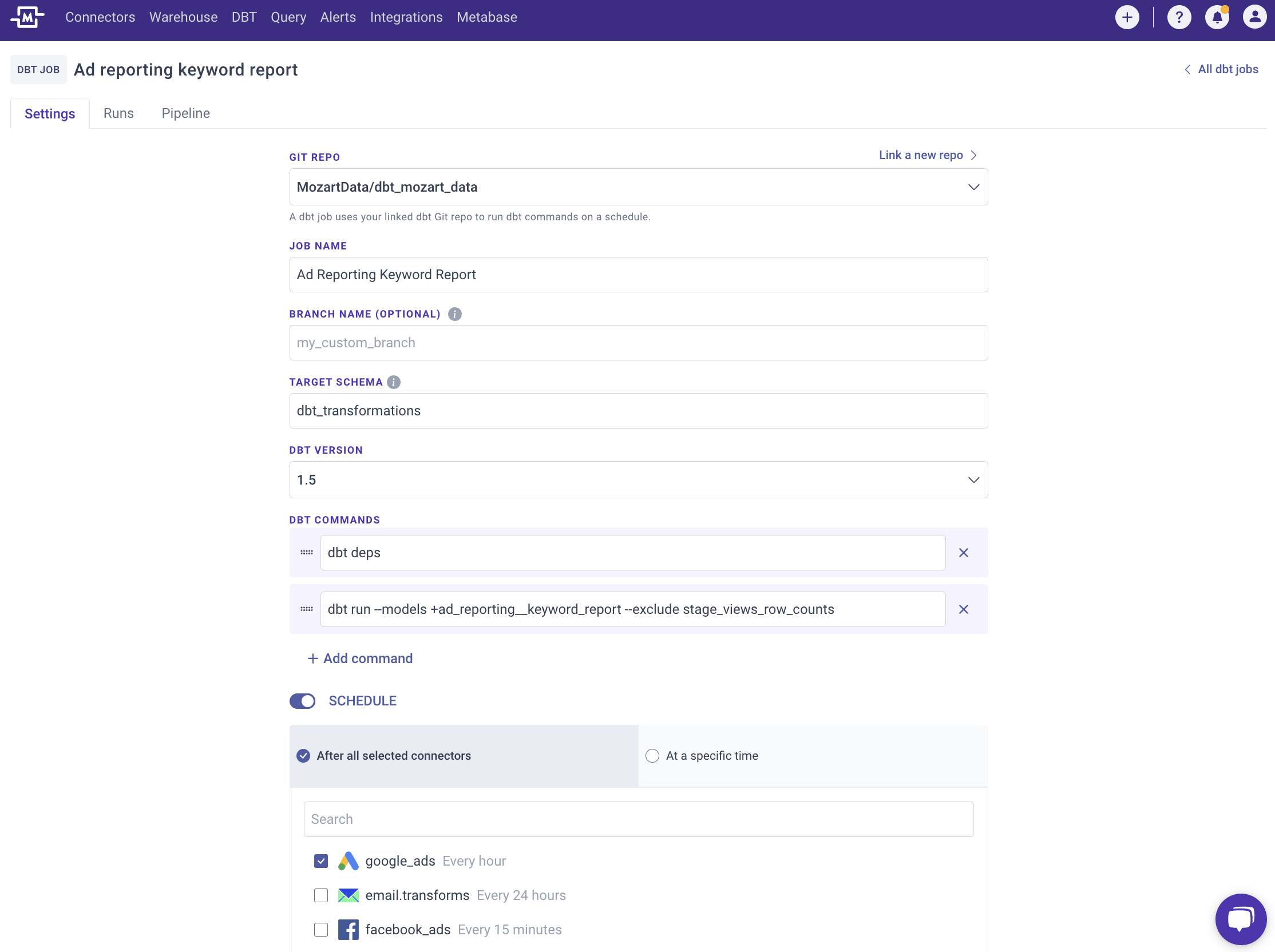
2. Powerful collaboration environment
The user interface provided by Mozart promotes an environment where data professionals and non-data team members, such as marketers and operators, can collaborate on both Mozart’s SQL-based data models and dbt data models, enabling efficient teamwork, data democratization, and enhanced productivity. With Mozart, operators can easily define and manage data pipelines. At the same time, data teams can also leverage the power of dbt Core to create transformations in the shared project space inside Mozart.
This improves cross-functional collaboration and the efficiency of data engineering processes and promotes knowledge sharing across teams, leading to more insightful and impactful analytics outcomes.
3. Interoperability of dbt and Mozart Data models
Integrating dbt Core into Mozart ensures smooth interoperability between dbt and Mozart models, enabling users to leverage the strengths of both platforms and streamline their data engineering processes. This integration helps eliminate any silos between different data engineering processes owned by operators and data teams, enabling a more cohesive and efficient workflow for teams.
4. Budget-friendly alternative to dbt Cloud
As dbt Cloud introduces recent pricing changes – which are tied to the number of developer seats and successful models – some customers may face increasing costs as a barrier to adopting dbt Cloud. While dbt Labs offers great solutions and products, this means that both new and existing dbt Cloud customers will receive a larger dbt Cloud bill starting this year. But most importantly, the consumption-based pricing model might influence data model design decisions, and the seat-based pricing model steer companies away from data democratization.
By using Mozart as an orchestration tool, users can leverage the full capabilities of dbt Core without the need to pay extra for seats or the number of successful models built in Mozart.
At Mozart, our mission is to enable companies to scale their data practice and reach data maturity by providing cheaper, better, and faster solutions. Our comprehensive, all-in-one data platform is just one part of the mission. We are truly excited to offer a cost-effective and resource-effective alternative to other orchestrators such as dbt Cloud or Airflow, while providing comparable feature sets at a more affordable price point.
As organizations look to improve cost-effectiveness across departments and allocate their resources more efficiently in unsteady economic times, Mozart ensures that users can enjoy the benefits of dbt Core’s powerful features and build production-grade data pipelines without compromising on their budget, making Mozart and our orchestration tool an attractive option for organizations looking to optimize their data engineering processes.
5. The freedom to build transforms: your work style, your choice
Mozart empowers users to broaden their range of capabilities by enabling data transformation using either dbt Core or Mozart SQL Transformations, allowing for greater flexibility and choice.
While dbt Core provides a comprehensive set of features and tools for data modeling and transformation with SQL, jinja, and macros, Mozart’s SQL Transformation layer offers an alternative approach for users who prefer working only with SQL. This flexibility allows users to choose the best approach based on their specific requirements and expertise to tackle a wide range of data engineering challenges. For example, users can access both the dbt templated code which contains jinja, macros, and SQL, as well as the dbt compiled SQL code which “translates” the dbt code into a more commonly understood SQL code for non-dbt users:
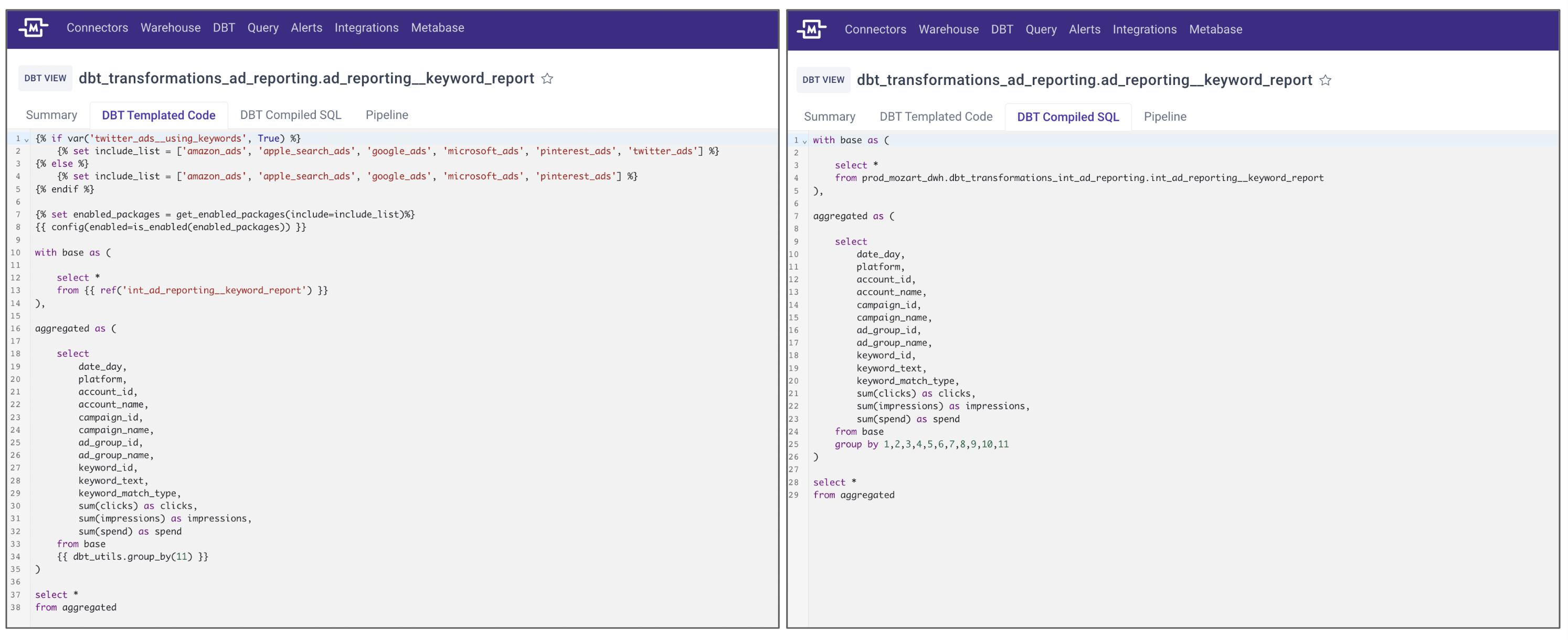
6. Unified orchestration with full data pipeline context
Mozart has a comprehensive understanding of all your data pipelines across all connectors and tables in your data warehouse. Having this full context allows for unified job execution and complete, end-to-end pipeline visibility. Users can schedule the dbt jobs to run based on a set interval (cron) or based on source data’s freshness.
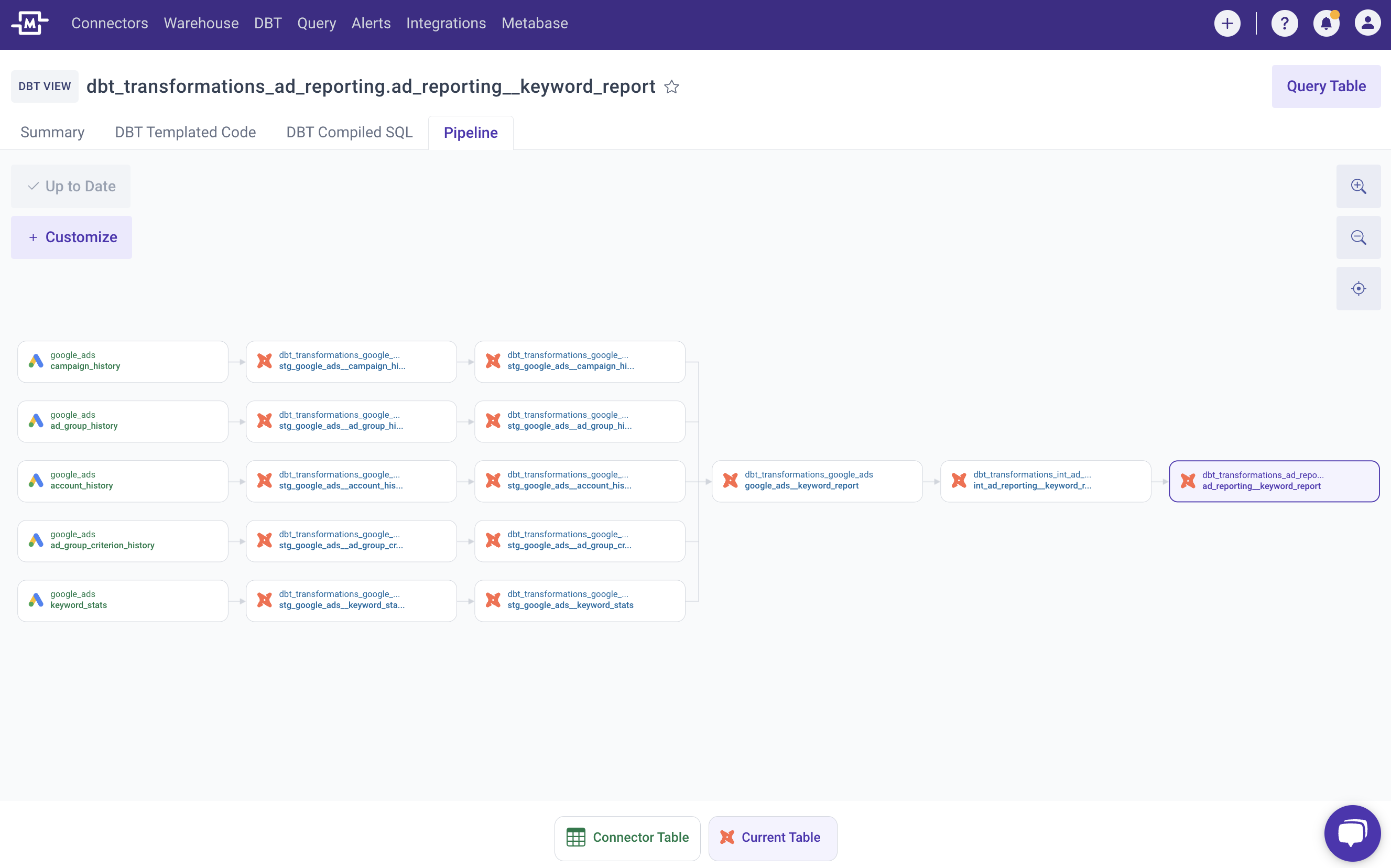
7. Leveraging dbt package hub
One of the main benefits of using dbt is the ability for analysts and analytics engineers to create and share packages within their team and with everyone else in the broader dbt community through dbt Hub. Packages can help you scale your data products more effectively with reusable SQL queries, data models, metrics, and macros. Packages promote knowledge-sharing both internally and externally, allowing the analytics community to leverage the collective knowledge and experience of other dbt users. And this helps save time and the effort in creating and maintaining data models. Check out various packages that you can use in dbt Hub.
Excited about Mozart + dbt Core Integration? We are too!
Here are some next steps you can take:
- Want to see it in action? Request a demo through our demo form.
- Want more guidance on leveraging the powerful duet of Mozart and dbt Core? Explore our Help Docs.
- Ready to take the stage? Sign up for Mozart’s free-tier plan now using our signup form.
dbt™ is the emerging industry standard platform for analytics engineering in the modern data stack. It is used by thousands of companies including JetBlue, HubSpot, and Cisco, as well as data teams at startup and growth stage companies. The dbt Community is one of the most active developer Slack communities and hosts Meetups on five continents. dbt, dbt Core, and dbt Cloud are trademarks of dbt Labs, Inc.

